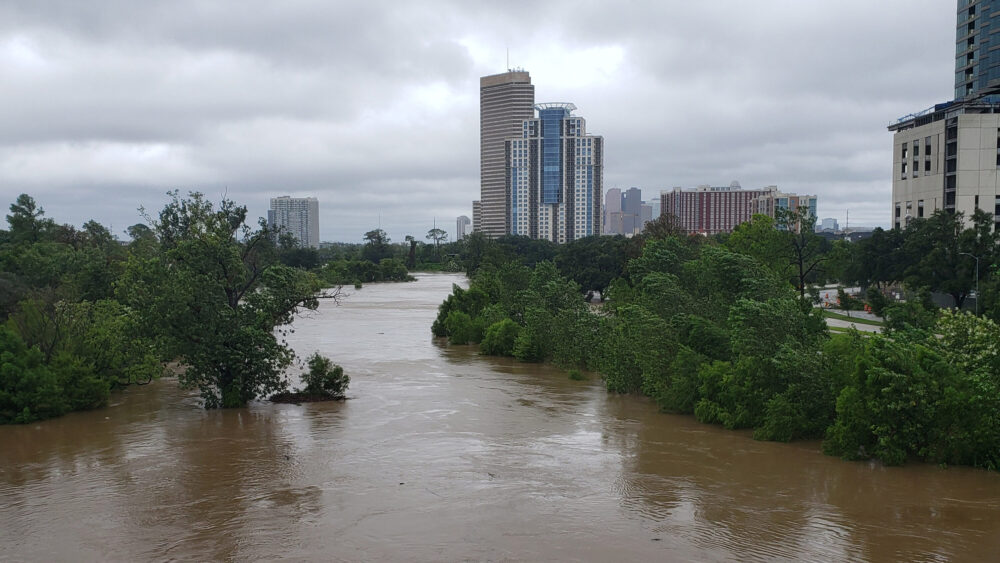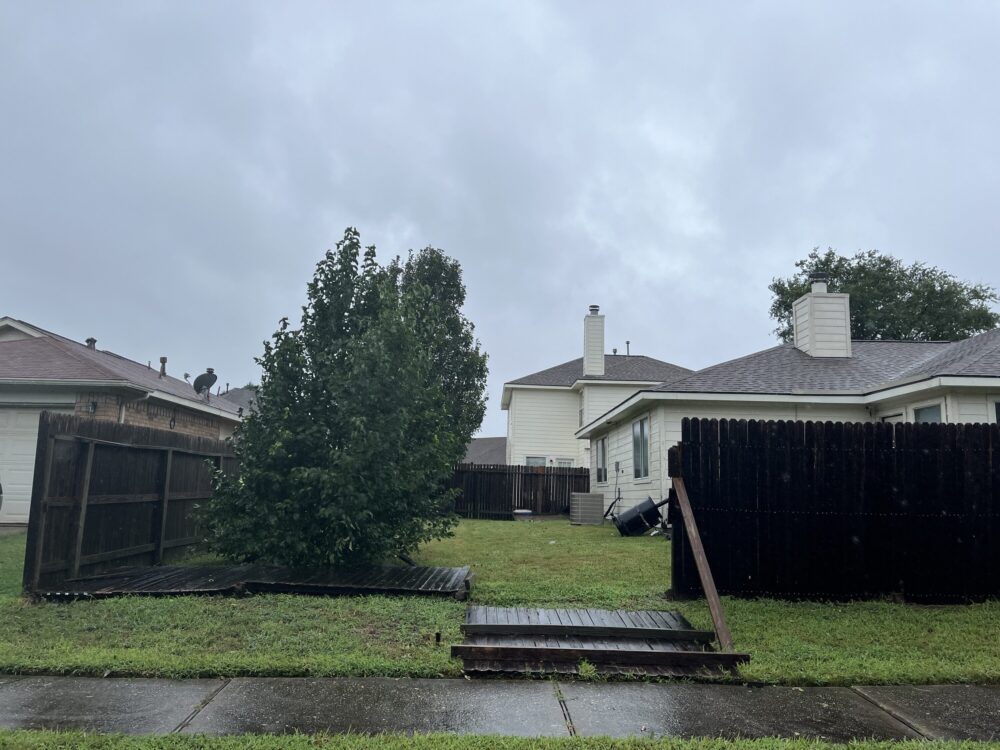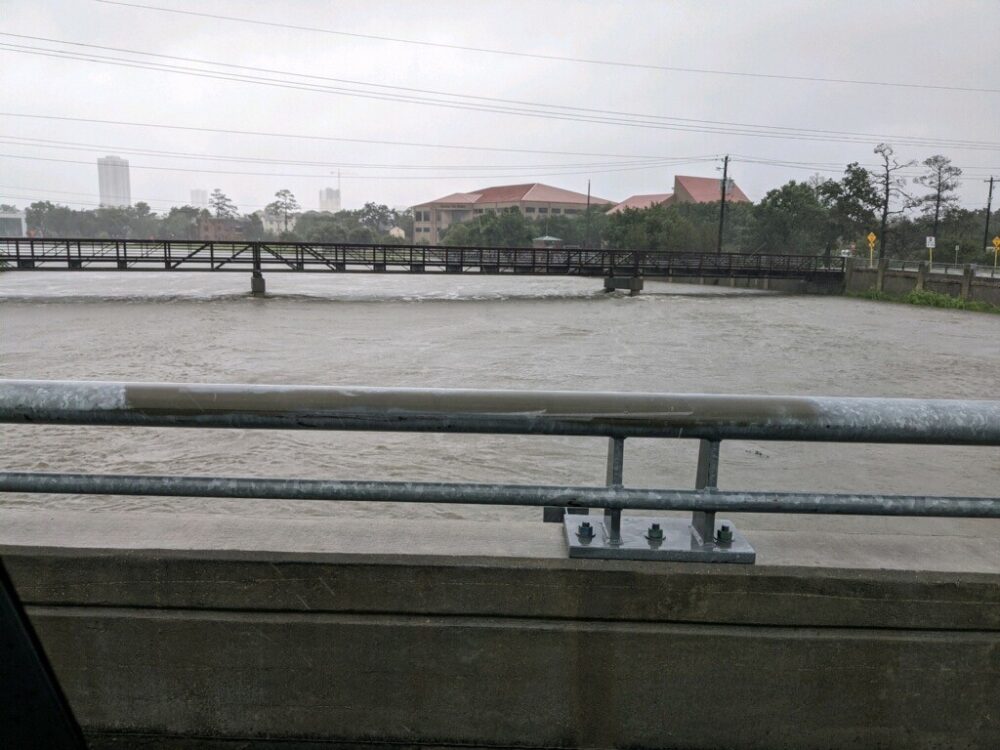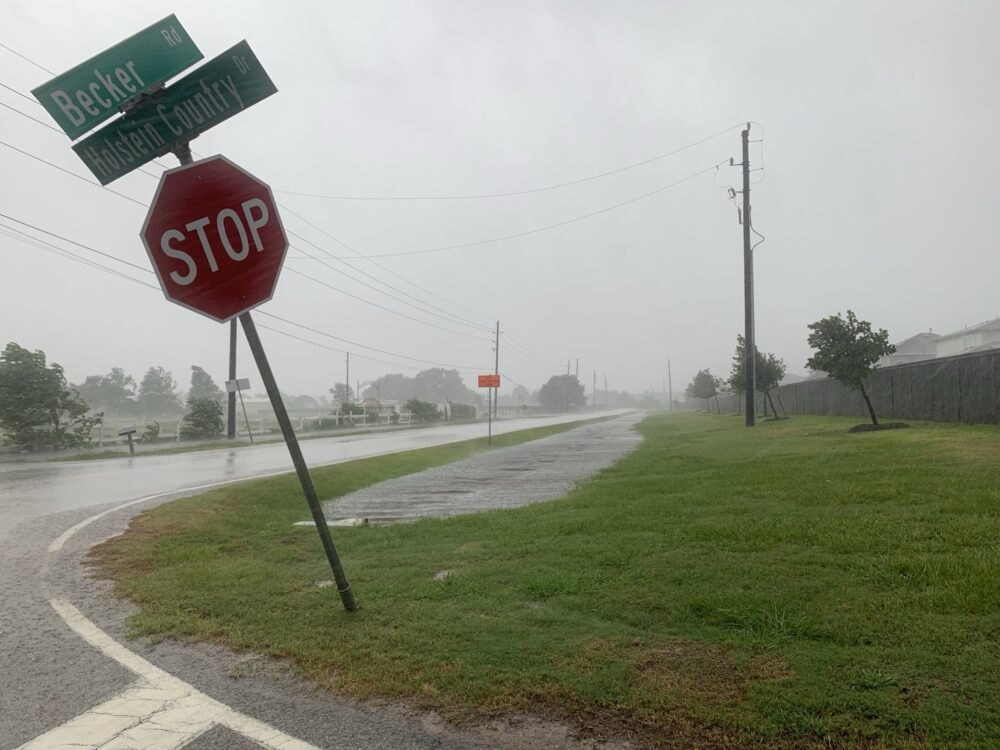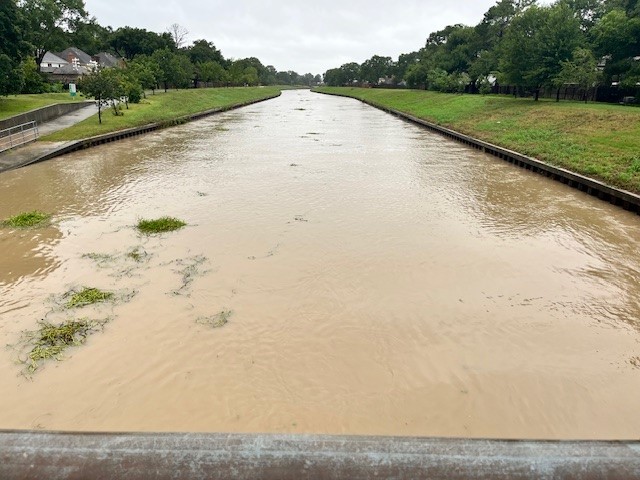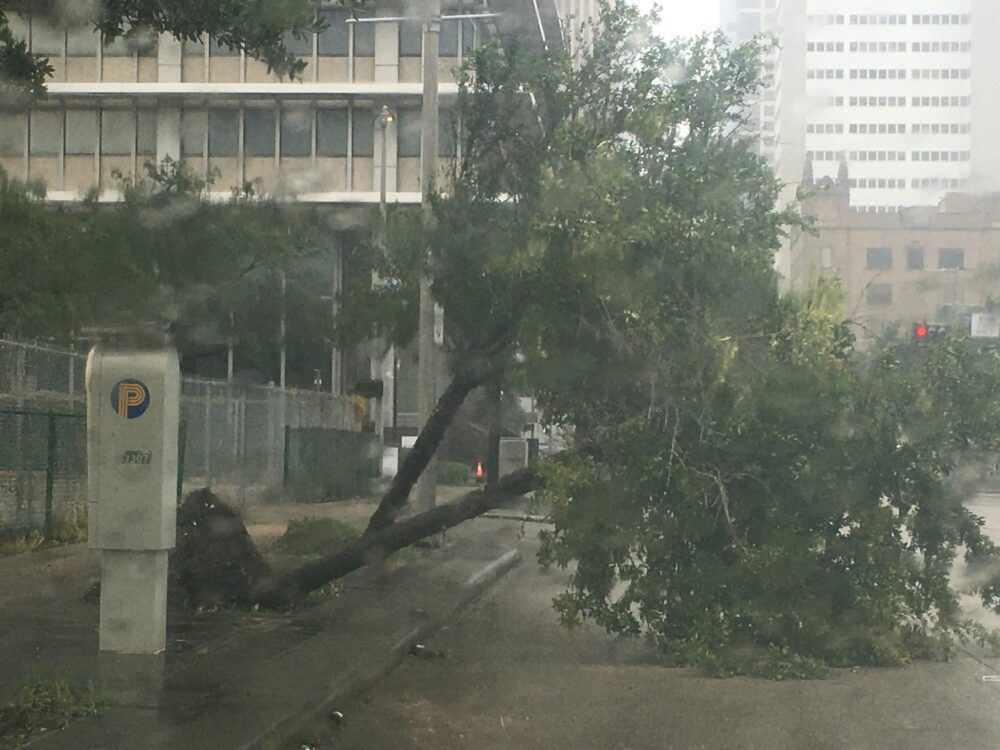Beryl brought heavy rain and strong winds to the Houston area Monday morning while causing widespread power outages and at least two deaths, according to local officials.
The storm made landfall near Matagorda around 4 a.m. Monday as a Category 1 hurricane, according to the National Weather Service, bringing 80-mile-per-hour, hurricane-force winds to portions of the Texas coast. It was downgraded to a tropical storm shortly after 10 a.m., when it was moving north through the Houston region.
As of 12:45 p.m., more than 2.2 million homes and businesses in the Houston area were without electricity, CenterPoint Energy’s online outage tracker showed. And at least two people had died as a result of fallen trees.
A tree fell on a home in Humble, killing a 53-year-old man inside, the Harris County Sheriff’s Office reported. The man was reportedly “sitting in house with family, riding out the storm. An oak tree fell on roof and hit rafters, structure fell on the male. Wife and children unharmed,” Harris County Sheriff Ed Gonzalez wrote on X.
There also was a death in northwest Houston, near the intersection of FM 1960 and Kuykendahl Road, according to Gonzalez and Harris County Precinct 3 Commissioner Tom Ramsey. Gonzalez said a 74-year-old woman was killed by a tree that fell on a home.
“This is a major event,” Ramsey said.
RELATED: Houston Public Media Hurricane and Tropical Storm Tracker
Several roadways across the region had become flooded by about 10:30 a.m., according to Gonzalez. And with stronger-than-expected winds that had caused 11 power transmission towers to fall, Harris County Judge Lina Hidalgo urged Houston-area residents to shelter in place until the afternoon and try to stay away from windows.
“Please stay safe, stay home,” Hidalgo said. “We’re still asking that folks stay where they are until at least noon and we’ll get through this.”
METRO, the public transit provider for the Houston region, announced shortly before 1 p.m. that it had suspended all of its services for the remainder of the day.
Health care facilities impacted
The St. Luke’s Health-Brazosport Hospital lost power and was damaged Monday morning, according to the health system, which said some patients were transferred to other hospitals while noting that no patients or staff were injured. The facility was operating on the power of a generator and remained opened for emergency services, the health system said.
Most other hospitals and emergency rooms around the Houston area remained open Monday, although many other clinics and medical facilities closed because of the storm. Harris Health closed its clinics and outpatient facilities, but its two hospitals, Ben Taub and LBJ, continued to operate.
All M.D. Anderson locations closed for patient appointments, although some urgent procedures were taking place at its Texas Medical Center campus. Kelsey-Seybold closed all of its clinics Monday.
The hospitals operated by Houston Methodist and Memorial Hermann Health System were open, although Memorial Hermann’s convenient care centers were open only for emergency services. Memorial Hermann’s other outpatient facilities, including its imaging and sports medicine locations, were closed.
Rainfall totals exceed 5 inches
A tropical storm warning was in effect for much of the southeast Texas region as of 11 a.m. Monday, with the Houston and Beaumont metro areas also under a flash flood warning, according to the National Weather Service. A storm surge warning remained in effect along the Gulf Coast between Galveston and Matagorda Bay.
According to the Harris County Flood Warning System, much of the Houston area received at least 5 inches of rainfall Monday morning, with some areas in the southern part of the county receiving 9 inches or more.
Houston TranStar cameras detected street flooding across the city. High water locations were detected on IH-69 Southwest Northbound at Dunlavy, Beltway 8-South Westbound before Almeda and Westpark Tollway Eastbound at Beltway 8, according to TranStar.
City leaders on Sunday urged residents to stay off of the streets as Beryl pushes through the metropolitan Monday.
RELATED: Houston braces for Beryl: Rain, flooding and tropical storm force winds likely
“The less people on the road, the easier it is for us to do our job,” Acting Police Chief Larry Satterwhite said during a press conference Sunday. “The less chance that we will have to perform a rescue.”
“If you do have to go out on a roadway in a vehicle and drive around, if you see a body of water on the roadway, do not drive through that thinking you are going to get through that.”
The White House said Sunday that the Federal Emergency Management Agency had sent emergency responders, search-and-rescue teams, bottled water, and other resources along the coast.
Some coastal cities called for voluntary evacuations in low-lying areas that are prone to flooding, restricted beach camping and urged tourists traveling on the Fourth of July holiday weekend to move recreational vehicles from coastal parks.
RELATED: Houston region prepares for heavy rains as Beryl approaches Texas coast
Lt. Gov. Dan Patrick, who is acting governor while Gov. Greg Abbott is traveling in Taiwan, issued a preemptive disaster declaration for 121 counties.
Beryl earlier this week battered Mexico as a Category 2 hurricane, toppling trees but causing no injuries or deaths before weakening to a tropical storm as it moved across the Yucatan Peninsula. The system crashed through the Caribbean before that, killing 11 people.
There were more than 200 canceled flights at both Bush Intercontinental and Hobby airports.
“As the storm approaches and people plan to stay indoors and safe from the storm, we want to remind everyone that our airports are not equipped to serve as storm shelters,” according to the Houston Airport System. “We lack the supplies and staff to accommodate people seeking refuge during the storm.”
Travelers should check with airlines for the latest updates and options for rebooking flights.
Beryl is the 10th hurricane to hit Texas in July since 1851 and the fourth in the last 25 years, according to Colorado State University hurricane researcher Phil Klotzbach.

